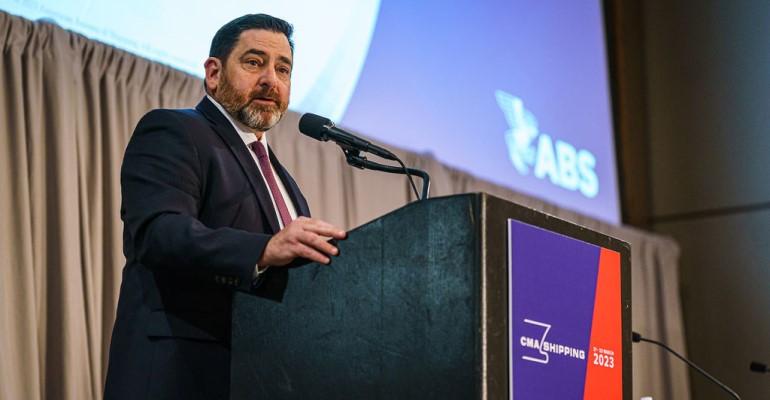
2023 is a year of acceleration for the maritime industry – ABS
STAMFORD : Speaking at the keynote session of CMA Shipping 2023 in Connecticut, ABS Vice President, Regional Business Development North America, Roy Bleiberg, laid out his view on what the industry can expect in 2023 when it comes to decarbonisation. Preparing for rapid technology advancement and regulatory change in the maritime industry cannot be business as usual, according to ABS.
“Rapid change is now the one constant for all of us. Whether this is driven by the addition of carbon as a revenue stream to your balance sheets, or the ripple effect of alternative fuels across your operations, or even the geopolitical influences driving change in established trades, we foresee entire business models changing as a result,” said Bleiberg.
“I would argue that in 2023 is going to accelerate the curve and it must if we’re going to hit our 2050 targets.”
The IMO’s MEPC 80 is expected to be a regulatory accelerator of change in the industry and ABS anticipates the meeting will expand the scope of emissions to account for the full lifecycle of a fuel. Between that and the inclusion of ship operations through CII regulations, more stakeholders will be brought into the maritime decarbonisation conversation to face the mounting challenges.
“2023 will see a significant increase in demand for fuel flexibility as operators look to hedge against geopolitical-driven price volatility, and the need for global bunkering infrastructure development. Currently, dual fuel and dual fuel ready vessels represent 35% of the vessels on water, 57% if you go by gross tonnage. That will increase as the available fuel mix widens this year, with methanol retrofit trials beginning in earnest, and with ammonia engines becoming available in 2024,” said Bleiberg.
Beneath the domination of LNG in the dual fuel fleet and orderbook, ammonia- and methanol-ready vessels are growing in popularity and significant further growth is expected in the coming months.
“2023 is likely to be a year of very rapid methanol growth. Its relative technical simplicity and ease of handling combined with maturing engine technologies are being supported by expansion of of global infrastructure. Currently, there are 95 methanol fuel vessels on the orderbook and 65 methanol-ready vessels. This will certainly increase given its use offers multiple pathways, eventually, to reach to carbon neutral and carbon zero.”
On the supply side, projects totalling 8m tonnes of green methanol production are being tracked by the Methanol Institute, he added.
Green corridors, consumer pressure, technological advancement and the unifying force of data platforms will all have their own significant advancements in 2023, argued Bleiberg.
“If there was one word to describe 2023 I would choose acceleration. As the forces of regulation, technology, fuel and vast infrastructure investment combine and reinforce one another, the pace of change we have become to us to is only going to increase.”
“Despite the uncertainty and widespread disruption, faster change is going to be required if we are to hit our decarbonisation targets, let alone net zero. This is the challenge before us. We know 2023 will be a year of profound change,” said Bleiberg.

